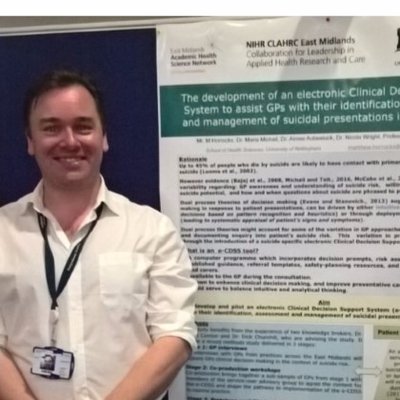So far this year, four students have been awarded with their PhDs funded by ARC East Midlands.
A huge well done to Dr Abigail Lee, Dr Dan Lane, Dr Humaira Hussein and Dr Matt Horrocks on their achievements. We wish you all the best for the future!
The PhD research varied across our ARC themes on Multiple Long-term Conditions and Mental Health and Wellbeing. The key topics covered:
- An online interactive handbook for people living with mild dementia
- Translation of mass spectrometry assays from the University and into the clinic, including COVID-19 testing methods
- Comparing the effectiveness of newly developed glucose-lowering drugs for the treatment of hyperglycemia in patients with type 2 diabetes
- Development of an electronic clinical decision support system, to assist with the identification and management of suicidal thoughts
More details can be found below.
Dr Abigail Lee
Abigail’s PhD explored the use and effectiveness of an online interactive handbook, the PRIDE-app, in people living with mild dementia. The PRIDE-app promotes independence and self-management, and encourages maintain daily activities and social interactions.
The findings suggest that the PRIDE-app has a place within dementia services and that the content is relevant and helpful.
Abigail is now working as an Assistant Psychologist within Sheffield Teaching Hospitals NHS Trust. This new opportunity has enabled her to experience more specialised clinical work and gain knowledge of rare conditions. The role combines inpatient and outpatient work, and involves providing cognitive assessments and talking therapies to people with a range of neurological conditions including Stroke, Dementia and Functional Neurological Disorder.
Dr Dan Lane
Dan’s PhD was on the translation of mass spectrometry assays from the University and into the clinic. He worked on two distinct areas; adherence testing and COVID-19 diagnostics. In adherence testing, Dan created sub-minute assays that could determine circulating drug concentration. As for the COVID-19 diagnostics, Dan worked on the DHSC led directive 'Operation Moonshot', where he worked as a collaborative across Universities and NHS facilities to develop alternatives to RT-PCR testing. Dan successfully developed a mass spectrometric test that was translated into clinical use.
Dr Humaira Hussein
Humaira’s PhD research, titled Comparative effectiveness of SGLT-2is and GLP-1RAs in type 2 diabetes, conducted a network meta-analysis to assess the comparative effectiveness of glucagon-like peptide-1 receptor agonists (GLP-1RAs) and sodium-glucose co-transporter-2 inhibitors (SGLT-2is) in randomised controlled trials.
Currently working as a Senior Information Analyst for NHS Digital, Humaira said: “Doing my PhD in Diabetes research has been such a challenging and rewarding experience. A huge amount of appreciation goes to my supervisors; Professor Laura Gray, Professor Kamlesh Khunti and Dr Francesco Zaccardi. Their continued support and advice has introduced me to a wide range of fantastic opportunities which led me to the position I am in now.
“I have met many different friends and colleagues during my time at the University of Leicester and I am so grateful for all the ways they have supported me. My biggest thanks would go to my family who were there for me from start to finish, lifting me up and helping me all the way.
“In my current role, my main area of focus is in COVID-19 research by analysing large datasets using statistical methodology and software. In addition to this, I also create dashboards to effectively graphically present findings in ways that are easier for audiences to understand.”
See publication links below for more information:
- https://onlinelibrary.wiley.com/doi/abs/10.1111/dme.13898
- https://dom-pubs.onlinelibrary.wiley.com/doi/abs/10.1111/dom.14008
- https://bmcpublichealth.biomedcentral.com/articles/10.1186/s12889-022-14213-6
Dr Matt Horrocks
 Earlier in the year, Dr Matt Horrocks was awarded with his PhD funded by CLAHRC East Midlands.
Earlier in the year, Dr Matt Horrocks was awarded with his PhD funded by CLAHRC East Midlands.
Matt’s PhD was on the development of an electronic clinical decision support system to assist with the identification and management of suicidality.
Currently working as an Assistant Professor of Mental Health and Psychological Therapies in the School of Health Sciences at the University of Nottingham, Matt said: “Having the opportunity to study this PhD, in the school of Health Sciences and embedded within CLAHRC East Midlands was a really special experience. I was able to learn more about the work that General Practitioners (GP) do to support people consulting with thoughts about suicide, and I was able to learn from people with lived experience about what helps them to trust in their GP as a first point of contact. I was able to bring these insights together to develop a decision support tool intended to help GPs work with people who might be on the pathway towards suicide. This is important because intervening earlier might prevent a future suicide attempt.
“The opportunity to engage in research which aimed to translate evidence towards improving routine practice was a tremendous privilege. To be surrounded by a community of encouraging and engaged stakeholders, scholars, people with lived experience and clinicians was humbling and inspiring.
“I would like to thank everyone who contributed to my PhD study, especially my academic supervisors, the GPs and people with lived experience who gave of their time and expertise, the School of Health Sciences, the East Midlands AHSN and the ARC East Midlands community. Thank you for the endless support and encouragement which I received and benefited from as a PhD student and which made this a superb experience”.
Published on: 23 Mar 2023
